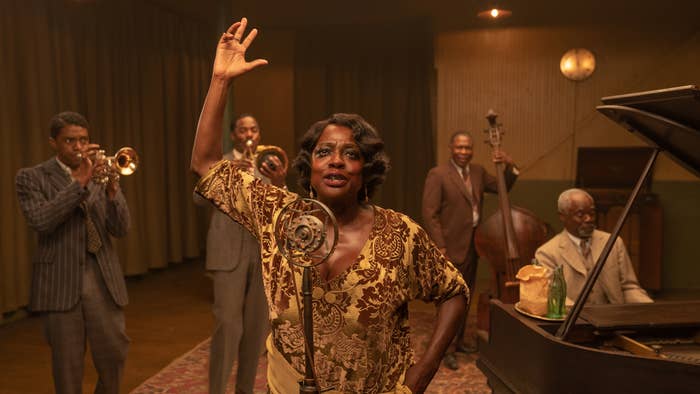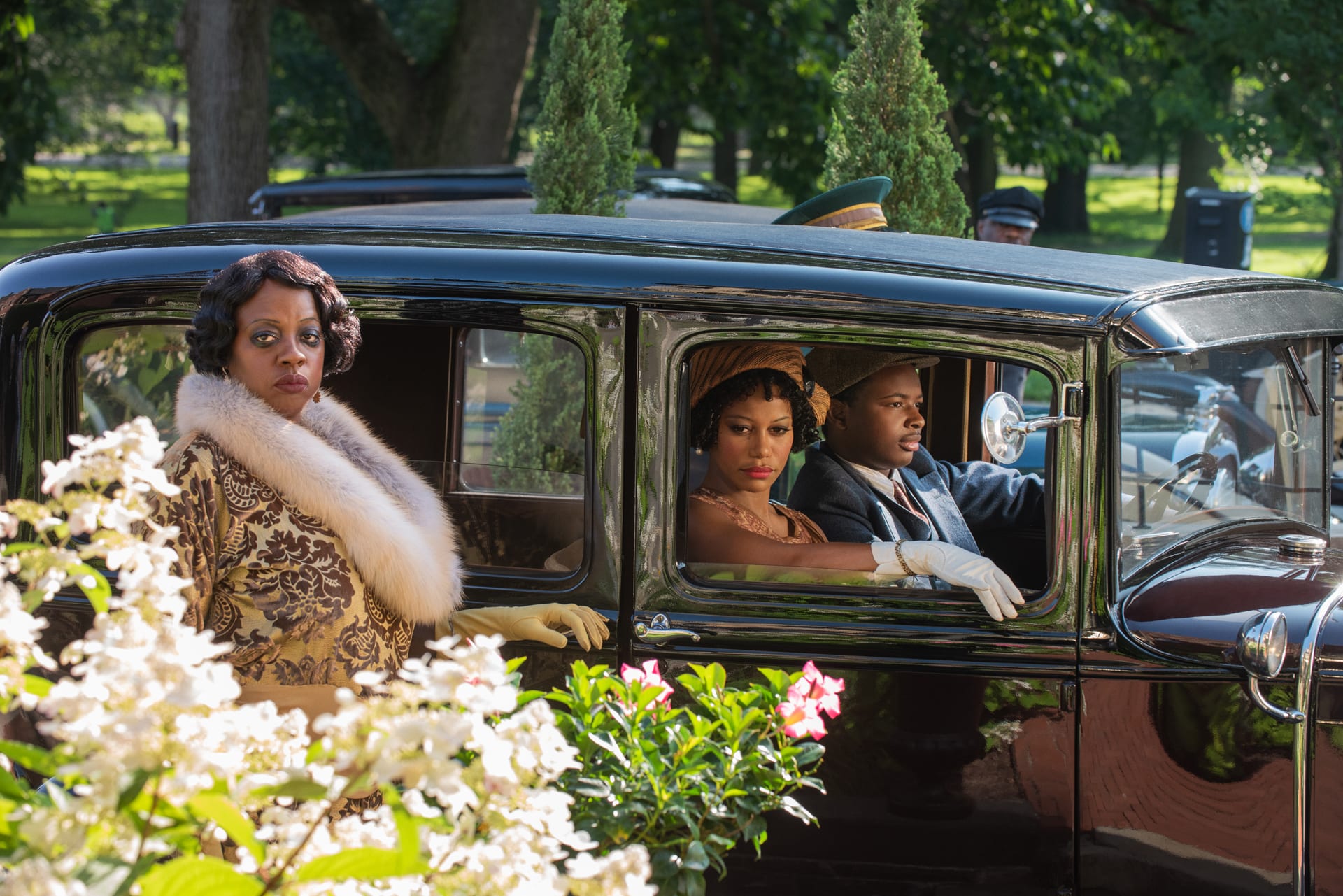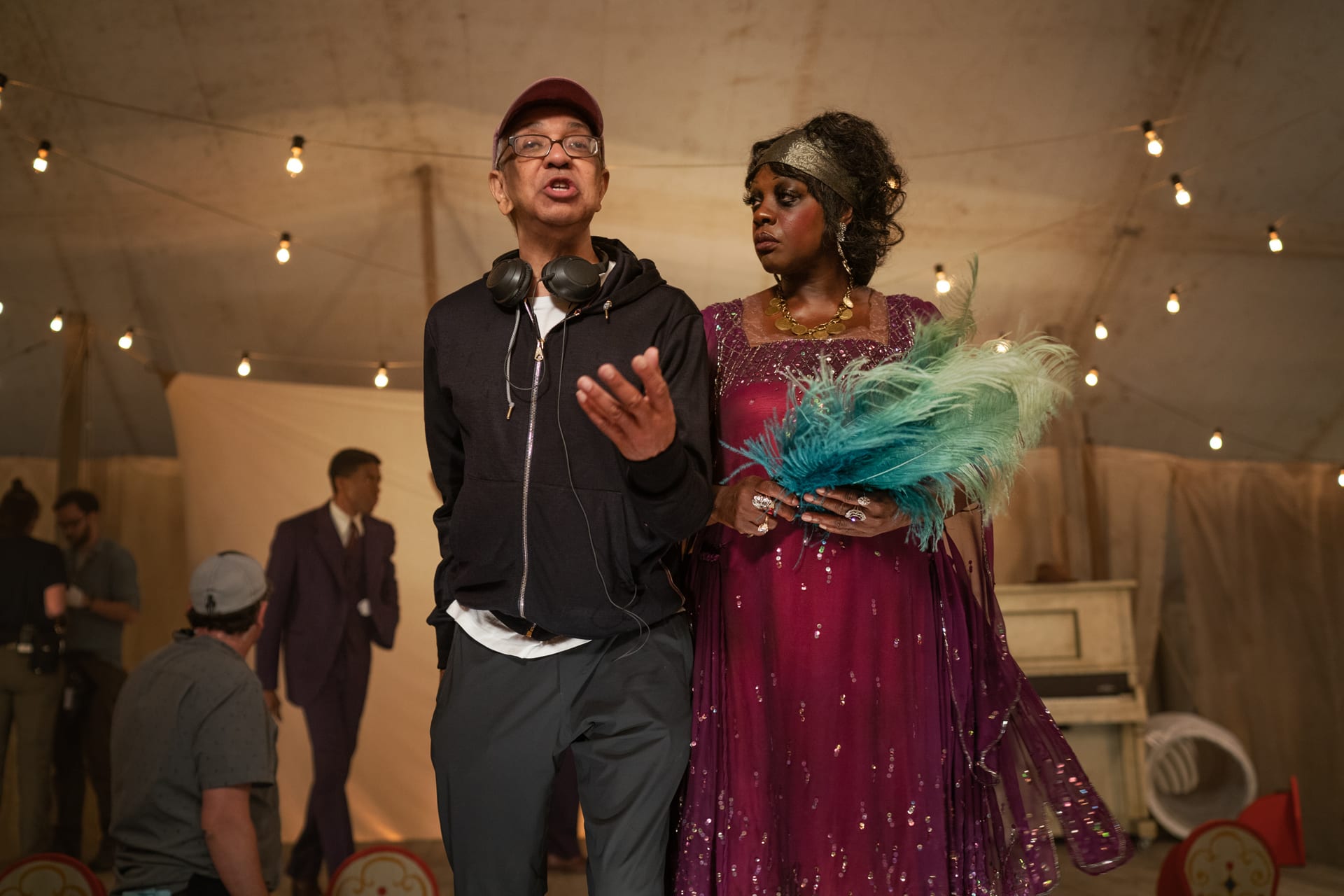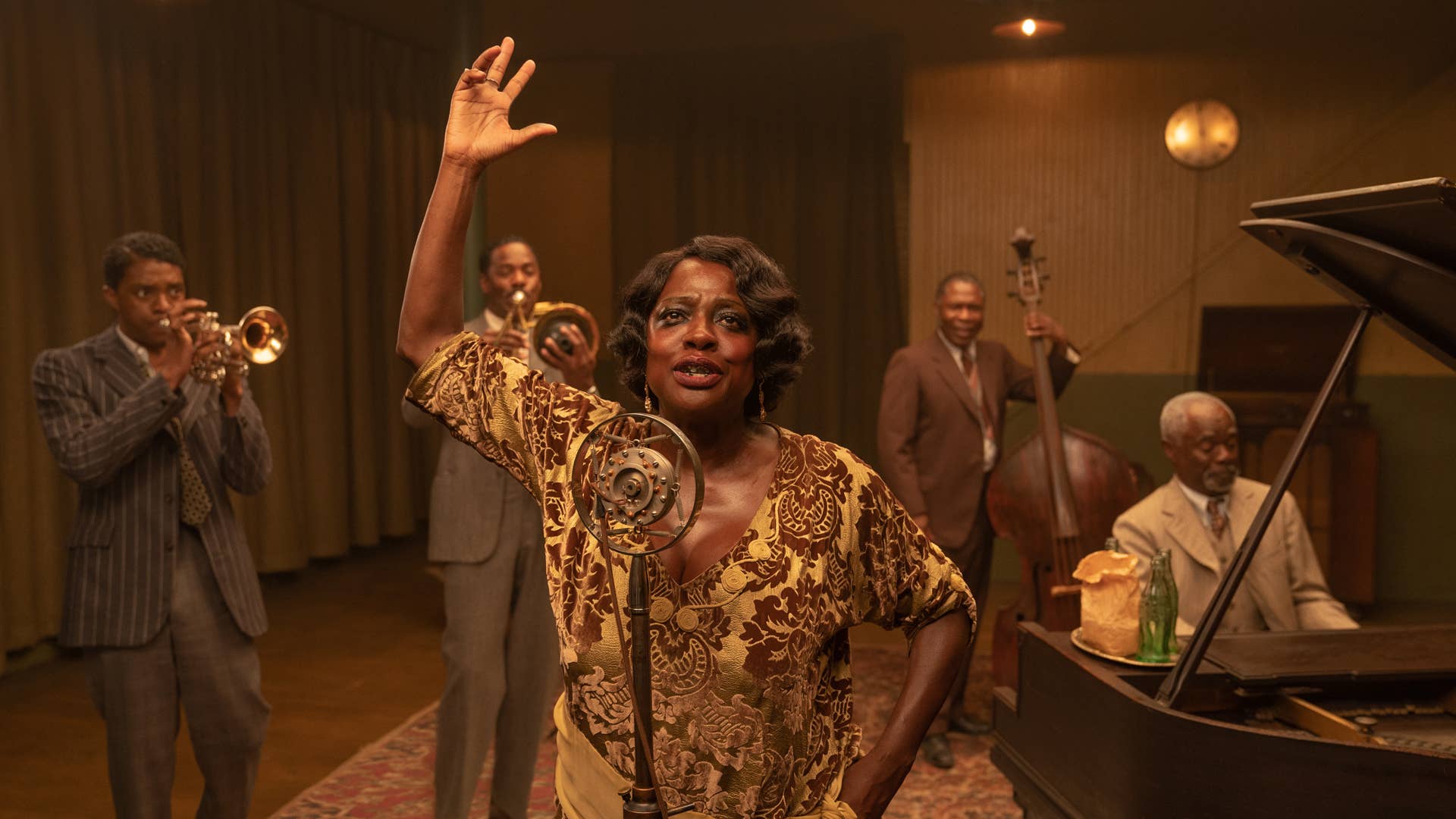
Ma Rainey’s Black Bottom has finally gotten the film treatment. August Wilson’s ode to music pioneer Ma Rainey, also known as “the Mother of the Blues,” airs on Netflix on Dec. 18—thirty-six years after its Broadway debut. What was then a celebration of Ma Rainey is today a celebration of August Wilson, Ma Rainey, and, sadly, Chadwick Boseman's legacy.
Viola Davis shines as Ma Rainey, Chadwick Boseman is a scene-stealer as Levee, a tormented but talented musician, and Glynn Turman, Colman Domingo, Michael Potts, Taylour Paige and more join the screen adventure set mostly in a recording session. Although the film is set in late 1920s Chicago, the layers of complexity such Black manhood, Black womanhood, Black queerness, and what it’s like to be taken advantage of by a capitalistic industry collide in what is still a modern-day tale.
Here, Complex catches up with Viola Davis, Taylour Paige, and director George C. Wolfe to chat about how Ma Rainey’s Black Bottom is a story that still resonates in the 21st century, working with Chadwick Boseman on his last film, and how the concept of “Black Lives Matter” is a timeless theme.
Ma Rainey’s Black Bottom is bittersweet because it’s a celebration of Ma Rainey, August Wilson, but now also Chadwick Boseman. Talk about working with such a talented roster of actors, particularly Chadwick.
Viola Davis: He was a joy, and he fit right into the Wilsonian canon of actors because he was an artist. I keep telling people he had the same agent he had when he started and never even moved up to a bigger agency. He was very intentional about the people he had surrounding him, didn’t have an entourage. He was all about the work. He was all about leaving Chadwick and his ego at the door and couldn’t have had a bigger heart, a bigger talent, and couldn’t have had bigger authenticity. I don’t see his life tragically. I see him as a life force.
George C. Wolfe: Glynn had done Ma Rainey before, but for the rest of us it was a very new play, so I think it was just digging in and trying to find what reverberated for us and what truths we could find within ourselves in order to make this world and this landscape very real, so there is no shorthand any time you do any new project. You have to make yourself available and make it invulnerable to the journey, so everybody jumped in; it was blessed with every single actor in my estimation who was totally brilliant. Chadwick was a joy to work with. Everybody was a joy. It was one of those lovely, valuable experiences and somewhat transformational in some respect, but it’s still too fresh and too new to understand how it’s reverberating inside of me, individually.
Taylour Paige: Sometimes I really am like, “Whose life is this?” A little girl from Inglewood. I can't believe it. The frequency of these people, their talent, their immense appreciation for truth and integrity, and our people, our ancestors, the voiceless; they all give a damn. Viola is just what you would expect her to be. She is a friend, she is sister, she is mama, she is auntie, she is committed, she is funny, she is serious, she is intentional, she cares about what we're talking about. Glynn is always down for a chuckle and has such amazing stories, and he really is an engaged listener. He takes the time to really listen and hear you, and he's just wise. Colman, who I'd gotten to work with twice now, is just the best spirit and sunshine on steroids, and Chadwick. He was just willing, and had no ego, and wanted to try it again and try it this way, and made sure I felt comfortable with our [intimate scenes], but also just...it was like we both knew though these people aren't real people. I'm sure there is a Dussie and a Levee somewhere. We knew these people existed, which are two people who had dreams to get up every morning as an act of resistance because to be Black—we're talking about 2020. Ten years ago, it was 2010, which means we were two years into having the first Black president of the United States. In 1920, 1919, what happened 10 years before that? We saw our ancestors that were just figuring out that they were free. We have ancestors who were walking around like if they even looked a certain way they could end up hung or dead or mistaken for somebody else. All of that is very much felt, and you can't really play these people without that heaviness, without that knowing, without that internalizing of, "Damn, can you just hold me? Can I just feel love? Is this my shot? Maybe if I play it like this, maybe if I wear these shoes, maybe if I swing my hips right I'll feel a little less disposable."
I think, just working with all of these incredible actors that I'm so deeply in awe of, it created this atmosphere for me to go there—along with George C. Wolfe, he's a genius,who wouldn't let no detail, no minutiae, go unnoticed. We honored the material, we honored August and we honored all of those that have come before us.

Viola, I know you were inspired by your transformation into Ma Rainey. Talk about how wearing that padded suit reminded you of the bigger women around you growing up, who were actually seen as sexy.
Viola Davis: It’s like, you come to Hollywood and a size 14 is huge [but] not in my world. In my world, you’re literally probably on the smaller size. The first woman of beauty besides my mom was Aunt Joyce, and Aunt Joyce was close to 300 lbs. You couldn’t tell her she couldn’t wear the latest fashions. She had her makeup, she had her hoop earrings, and every time she came, we were waiting by the door to sit with her, touch her skin, to do everything. She personified beauty and sexuality. It didn’t stop her from getting men. It didn’t stop her from even believing that she was desirable. But once again, it’s not about defining ourselves in the confines of the white structure. When we define ourselves for ourselves it’s a whole different world. That’s why when I put on the padding I was free. I loved it.
This story is so layered with generational baggage, queerness, equal pay issues. What will people, particularly marginalized creatives, see in themselves here?
Viola Davis: We are living in a time when we have to understand that racism has just evolved. It hasn’t disappeared. That’s why when people [look at this film] and say it’s timeless, it’s timeless because of the fabric of what makes America. Part of the fabric of what makes America—besides hot dogs and individualism—is racism and that’s the beauty of what August did because he gives you a history lesson of what racism is, and being Black in America through 10 decades of life in a century’s cycle of plays. But what he also gives you is how it affected us and our humanity. So that’s what you get. You get a woman who’s at the top of her game called "the mother of the blues," but she’s still having to hustle for her worth. What you get is a young man who has all the dreams in the world but the memories and the trauma that he’s being driven by is a bunch of white supremacists who hung his father and raped his mom, and white producers who are taking advantage of him. We don’t even have copyright laws, they're stiffing us out of our money. They stole Levee’s song. That’s still something that we have to navigate within a culture that is solely ours. You get all of it.

George C. Wolfe: While we were working on it, one doesn’t think about how it reverberates. One is focusing on the moment to moment storytelling truth, wanting to make sure what’s at stake with the characters at any given moment—that when Levee and Toledo are going at each other and what’s Ma thinking about this? So, one isn’t afforded, for lack of a better word, the luxury to look at the themes because one is so busy being invested in the moment to moment discovery as the characters are discovering it. The characters don’t know they’re in a film. The characters are in life, and so they're figuring out what they’re going to do next in response to what somebody has done.
We have the conversation about themes and ideas and what it’s about to inform the work, but the ultimate fundamental job in working on any piece of art is to embody this moment as fully as you possibly can, and if you do that all the way through without pulling back and being aware of the work that you’re doing, hopefully it makes for a very fulfilling and dynamic journey for an audience witnessing it because then they have to surrender their objectivity and go on the objective journey with you.
Taylour Paige: Dussie, my character, is auditioning for her agency because I think she just is looking for some hope, some window of possibility. She's like, "Maybe if I just do this a little bit well or, if it doesn't work out with Ma, I'll go with Levee, but somebody will hold my hand, somebody will take me out of this uncertainty because I don't want to go back. I don't want to go back there."
When reflecting on my life, I've had some dark times, I've had some really low periods in my life, but I'm so thankful I've experienced them, because what is life but one big experience? But there are a lot of things that I honor that I've experienced, but I wouldn't want to have to go back to, now that I have the awareness, and the gratitude, and the expansion that I now know. I wouldn't want to go back. Stepping into Dussie reminded me—I think even in the last scene of the movie, when they get back into the car, I really played it in my head as a death. I was mourning the death of dreams, the death of all of those that have come before me who probably haven't been able to say what they needed to say, who've been feeling like they're screaming into a pillow or in some room with no windows and no one can see them, but they're screaming, "Can anyone hear me?" And I played it like, how many people do we not even know about that have seen, have thought, "If I just go up North to Chicago, if I just wear this or if I just do my hair like that, or if I just smile or I don't...maybe then I'll matter, I'll be valued." Unfortunately, we're still fighting that good fight right now, and it would be ignorant of me to act like that doesn't affect me when playing all of these dynamic beautiful, flawed women.
To all of your points, but especially you, Viola, Ma Rainey really didn’t care about respectability politics, and that point was illustrated in this film. Talk about the importance of this kind of story.
Viola Davis: The importance of this kind of story is to let people know that we existed. That we actually lived. There were Black people that actually lived, who had their own autonomy, their own agency, who know their worth. To see us in our world being defined by us and not through a white gaze. To see our humor, our language, our talent, how we loved, our tragedy. The type of memories that motivate us because otherwise we’re very seldom humanized on screen.
In culture, there is a huge divide between us and the rest of the culture. There is a sense that still there’s a huge separation. This is August’s way of introducing us to the mainstream. It’s us on our terms. That’s why I think this work is important.



